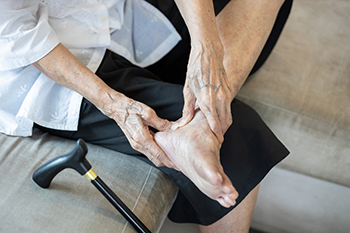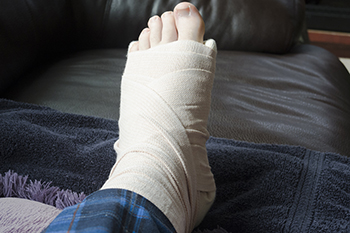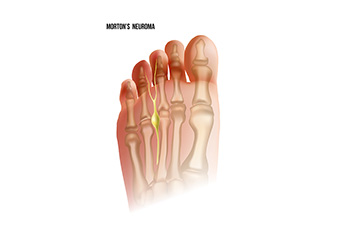Items filtered by date: November 2023
Understanding Associated Foot Conditions From Aging Feet

As we age, our feet become silent witnesses to the passage of time, bearing the cumulative effects of a lifetime of activity. Elderly feet often exhibit a range of conditions that require attentive care. Arthritis, a common companion in the aging process, may lead to joint pain and reduced mobility. Circulatory issues, including peripheral artery disease, can compromise blood flow to the extremities, contributing to cold feet and slower healing. Corns and calluses become more prevalent due to changes in skin elasticity, while toenail issues, such as fungal infections or ingrown toenails, demand careful management. Additionally, reduced fat padding on the soles of the feet can lead to discomfort and heightened susceptibility to injuries. Understanding and addressing these conditions are paramount for ensuring the comfort and well-being of elderly individuals. If you would like more information about possible foot conditions that can affect the feet of elderly people, it is suggested that you confer with a podiatrist who can provide you with the knowledge you are seeking.
Proper foot care is something many older adults forget to consider. If you have any concerns about your feet and ankles, contact Harris Greenberger, DPM from Fairfield County Foot Surgeons. Our podiatrist can provide the care you need to keep you pain-free and on your feet.
The Elderly and Their Feet
As we age we start to notice many changes in our body, but the elder population may not notice them right away. Medical conditions may prevent the elderly to take notice of their foot health right away. Poor vision is a lead contributor to not taking action for the elderly.
Common Conditions
- Neuropathy – can reduce feeling in the feet and can hide many life-threatening medical conditions.
- Reduced flexibility – prevents the ability of proper toenail trimming, and foot cleaning. If left untreated, it may lead to further medical issues.
- Foot sores – amongst the older population can be serious before they are discovered. Some of the problematic conditions they may face are:
- Gouging toenails affecting nearby toe
- Shoes that don’t fit properly
- Pressure sores
- Loss of circulation in legs & feet
- Edema & swelling of feet and ankles
Susceptible Infections
Diabetes and poor circulation can cause general loss of sensitivity over the years, turning a simple cut into a serious issue.
If you have any questions please feel free to contact our office located in Norwalk, CT . We offer the newest diagnostic and treatment technologies for all your foot and ankle needs.
Managing a Broken Foot

Managing a broken foot requires immediate attention and a structured treatment plan to ensure proper healing. Immobilization of the foot is often necessary to prevent further injury, and this may involve using splints, casts, or walking boots. The type of fracture dictates the specific immobilization method. Pain relief is an important aspect of management. In some cases, particularly for more complex fractures, surgery may be necessary to realign and stabilize the bones. Following immobilization, the patient usually needs to limit weight bearing on the injured foot, sometimes with the aid of crutches or a scooter. A podiatrist will establish a timeline for the gradual reintroduction of weight-bearing activities. If you have broken your foot, it is suggested that you make an appointment with a podiatrist as quickly as possible, and follow their instructions to prevent re-injury in addition to proper bone healing.
A broken foot requires immediate medical attention and treatment. If you need your feet checked, contact Harris Greenberger, DPM from Fairfield County Foot Surgeons. Our podiatrist can provide the care you need to keep you pain-free and on your feet.
Broken Foot Causes, Symptoms, and Treatment
A broken foot is caused by one of the bones in the foot typically breaking when bended, crushed, or stretched beyond its natural capabilities. Usually the location of the fracture indicates how the break occurred, whether it was through an object, fall, or any other type of injury.
Common Symptoms of Broken Feet:
- Bruising
- Pain
- Redness
- Swelling
- Blue in color
- Numbness
- Cold
- Misshapen
- Cuts
- Deformities
Those that suspect they have a broken foot shoot seek urgent medical attention where a medical professional could diagnose the severity.
Treatment for broken bones varies depending on the cause, severity and location. Some will require the use of splints, casts or crutches while others could even involve surgery to repair the broken bones. Personal care includes the use of ice and keeping the foot stabilized and elevated.
If you have any questions please feel free to contact our office located in Norwalk, CT . We offer the newest diagnostic and treatment technologies for all your foot and ankle needs.
Common Symptoms of Morton's Neuroma

Morton's neuroma, a nerve condition that affects the ball of the foot, can bring about discomfort and pain. Its symptoms are often distinctive and can be recognized with attention to detail. Individuals with Morton's neuroma may experience a sharp, burning, or tingling pain that radiates from the ball of the foot, typically between the third and fourth toes. This discomfort often feels as if there is a small pebble or an object inside the shoe, causing an irritation. It tends to worsen with weight-bearing activities, such as walking or standing and may improve with rest. Wearing tight, constrictive footwear can exacerbate the symptoms, making shoe choices essential for managing the condition. Additionally, some individuals may feel numbness in the affected toes, contributing to a sense of discomfort and imbalance. Swelling or a palpable mass at the base of the toes is occasionally noticed. Early recognition of these common symptoms is essential for timely diagnosis and appropriate treatment of Morton's neuroma, helping individuals find relief from their foot discomfort. If you have pain in this part of your foot, it is strongly suggested that you schedule an appointment with a podiatrist. This type of doctor can accurately diagnose and treat Morton’s neuroma.
Morton’s neuroma is a very uncomfortable condition to live with. If you think you have Morton’s neuroma, contact Harris Greenberger, DPM of Fairfield County Foot Surgeons. Our podiatrist will attend to all of your foot care needs and answer any of your related questions.
Morton’s Neuroma
Morton's neuroma is a painful foot condition that commonly affects the areas between the second and third or third and fourth toe, although other areas of the foot are also susceptible. Morton’s neuroma is caused by an inflamed nerve in the foot that is being squeezed and aggravated by surrounding bones.
What Increases the Chances of Having Morton’s Neuroma?
- Ill-fitting high heels or shoes that add pressure to the toe or foot
- Jogging, running or any sport that involves constant impact to the foot
- Flat feet, bunions, and any other foot deformities
Morton’s neuroma is a very treatable condition. Orthotics and shoe inserts can often be used to alleviate the pain on the forefront of the feet. In more severe cases, corticosteroids can also be prescribed. In order to figure out the best treatment for your neuroma, it’s recommended to seek the care of a podiatrist who can diagnose your condition and provide different treatment options.
If you have any questions, please feel free to contact our office located in Norwalk, CT . We offer the newest diagnostic and treatment technologies for all your foot care needs.
Transformation of Your Feet During Pregnancy

Pregnancy is a transformative journey for a woman's body, and it is not just the baby bump that undergoes changes. The feet also experienced their share of adjustments during this remarkable period. As the body produces the hormone relaxin to prepare for childbirth, it can affect the ligaments and tendons throughout, including the feet. This increased flexibility can lead to a temporary increase in shoe size. Swelling, known as edema, is another common foot change during pregnancy and is often caused by fluid retention. This can make wearing comfortable footwear imperative. Added pressure on the arches can trigger or exacerbate flat feet, resulting in discomfort or pain. Be prepared for these transformations, and remember that they are all part of the incredible journey to motherhood. If you would like more information about how to find relief from foot pain during pregnancy, in addition to learning more about how the feet change during this exciting time, it is suggested that you confer with a podiatrist who can provide you with useful knowledge.
Pregnant women with swollen feet can be treated with a variety of different methods that are readily available. For more information about other cures for swollen feet during pregnancy, consult with Harris Greenberger, DPM from Fairfield County Foot Surgeons. Our podiatrist will attend to all of your foot and ankle needs.
What Foot Problems Can Arise During Pregnancy?
One problem that can occur is overpronation, which occurs when the arch of the foot flattens and tends to roll inward. This can cause pain and discomfort in your heels while you’re walking or even just standing up, trying to support your baby.
Another problem is edema, or swelling in the extremities. This often affects the feet during pregnancy but tends to occur in the later stages.
How Can I Keep My Feet Healthy During Pregnancy?
- Wearing orthotics can provide extra support for the feet and help distribute weight evenly
- Minimize the amount of time spent walking barefoot
- Wear shoes with good arch support
- Wear shoes that allow for good circulation to the feet
- Elevate feet if you experience swelling
- Massage your feet
- Get regular, light exercise, such as walking, to promote blood circulation to the feet
If you have any questions please feel free to contact our office located in Norwalk, CT . We offer the newest diagnostic and treatment technologies for all your foot and ankle needs.

